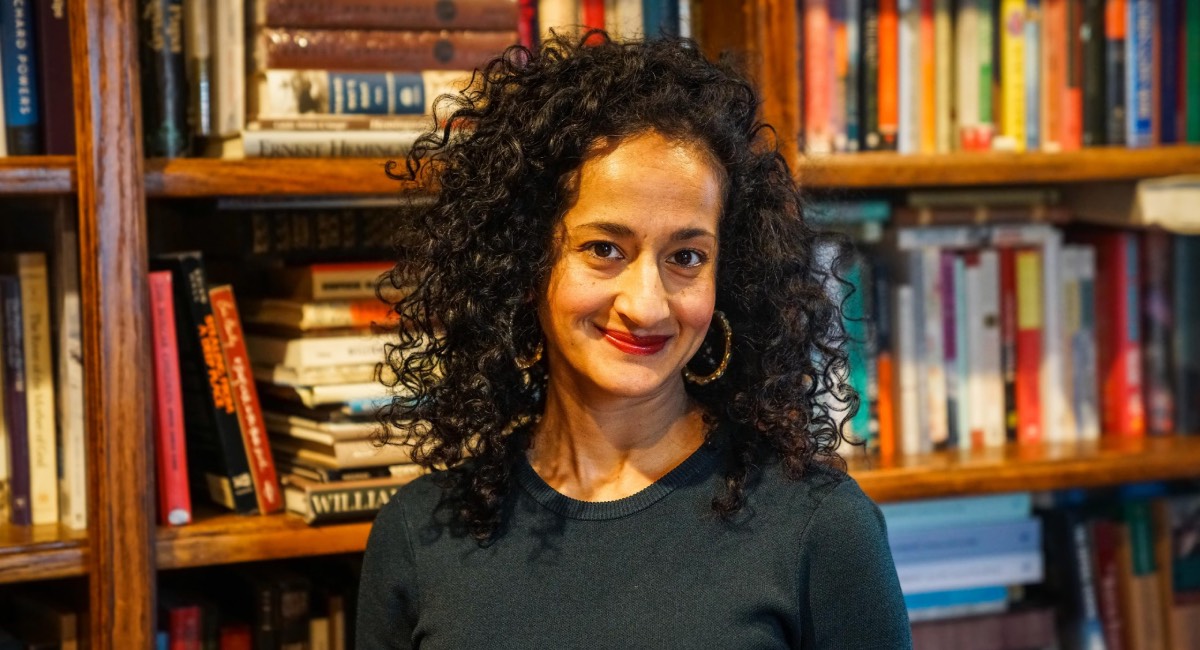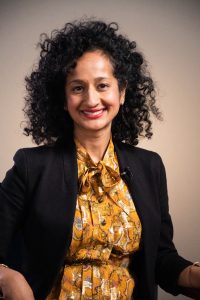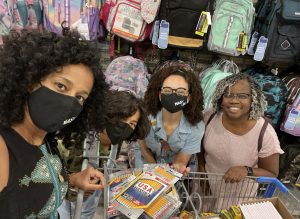
Megha Ramaswamy to assume role of chair of the Department of Health Systems and Population Health
“I worked in PR at an art book publisher, which was super-glamorous, and that’s how I wanted to experience New York City as a 19-year-old. And I did.”
Megha Ramaswamy enrolled at New York University with the goal of becoming a fashion journalist, “but that never took off. Honestly, one of the things that happened is I got really shy. It’s really hard to interview people and I never wanted to show up.” It was her partner’s pursuit of a public health degree that provided an intriguing outlet for her professional curiosity about sexual and reproductive health. “It was political and social and historical and contextual, and the ability to do science writing in a way that felt political and impactful really resonated with me. When I realized that there was another kind of job out there where I could really start delving into those issues, that became more appealing.“

On January 1, 2024, Dr. Ramaswamy, PhD, MPH, will become the new chair of the Department of Health Systems and Population Health (HSPop) in the School of Public Health at the University of Washington. Most recently, Ramaswamy was a tenured professor in the Department of Population Health at the University of Kansas School of Medicine, co-director of a KL2 Career Development Program, and associate director for Cancer Workforce Equity at the University of Kansas Cancer Center.
Ramaswamy’s work has focused on the intersection of sexual health and cancer prevention. For the past decade, her work on cancer prevention among individuals in the criminal legal system has been continuously supported by the National Institutes of Health / National Cancer Institute. She studies community health problems, works with stakeholders who are experts of their own lives, and comes up with plans for how best to implement solutions at individual, practice and policy levels.
“I am very aware of how traumatized we are by the COVID-19 pandemic, by war all over the world, by human rights violations, by political upheaval in our own country, and the revisiting of old issues I thought had been resolved but, as things turn out, maybe aren’t. There’s a collective trauma of racism, political upheaval, misinformation, disease, and now we have to forge a path ahead.”
“Everyone experienced a certain kind of trauma from the pandemic, and I’m interested to see how new students and frankly, old scientists and teachers dig their way out of all this to think about ‘how do we train a generation to honor and acknowledge these issues from the past, but prepare them to deal with the issues that are going to be happening in the future?’”
“I really want to work with the community in HSPop to consider the questions ‘what is our definition of public health impact and how do we want to show up in the world’, and empowering the people who participate in the department, students, staff, faculty for showing up in ways that are not only meaningful to them, but meaningful to the community at large.”
-Dr. Megha Ramaswamy, PhD, MPH
As chair, Ramaswamy intends to lead with a great deal of trust, a whole lot of compassion, and a little bit of the journalism skill set acquired early on. “I’m a sociologist, so I aspire to sit back as a researcher and observe how leaders lead and identify the places in which there is opportunity. I think the most important thing is trusting that the leaders of education programs and centers have institutional knowledge and know what they’re doing.”
“Rather than having a focus on the problems people bring to you, good department chairs pay attention to opportunities, according to the books. I’m really interested in this idea of being a great social scientist and observing where the opportunities are to support good science and education.”
Giving a Voice to the Marginalized
Ramaswamy’s commitment to health equity extends beyond academia, as evidenced by her service on the boards of local public health, sexual and reproductive health, and violence prevention organizations. Notably, she has actively volunteered as an evaluator for community non-profits and has mobilized individuals with involvement in the criminal legal system to register to vote.

Over the years, Ramaswamy has mentored over 250 high school, undergraduate, graduate, nursing, and medical students, and faculty through various roles leading education and career training programs. “My teaching and mentoring style is grounded in compassion, efficiency, and getting people to ’just go for it’ in their work.” Ramaswamy’s commitment to her students shows her dedication to making true connections and using each opportunity to make an impact.

“A former dean said to me that being a chair is really about maximizing impact. You have impact right now, with your students and with the few hundred women who participate in your sexual health and cancer prevention interventions. And yeah, there’s a lot of difficulty along the way of hearing lots of complaints and dealing with the everyday issues around budget and space and staffing. But there’s lots of joys in seeing the impact of other people succeeding.”
The breadth of programs and faculty within the HSPop department “is a dream situation, to have so many diverse voices coming from various disciplinary backgrounds and in some cases working at the cutting edge of public health and social issues. That’s an opportunity to train interesting people, but also to train people who are going to come up with the most innovative solutions to address the challenges facing public health today, both the historical problems, our historical traumas, and also to move the science forward for the next generation.”
“As for my shyness, I’m a researcher, so I interview people all the time. When I step back and weigh my personal discomfort against the potential social and political impact of this work, the shyness feels easier to overcome.”